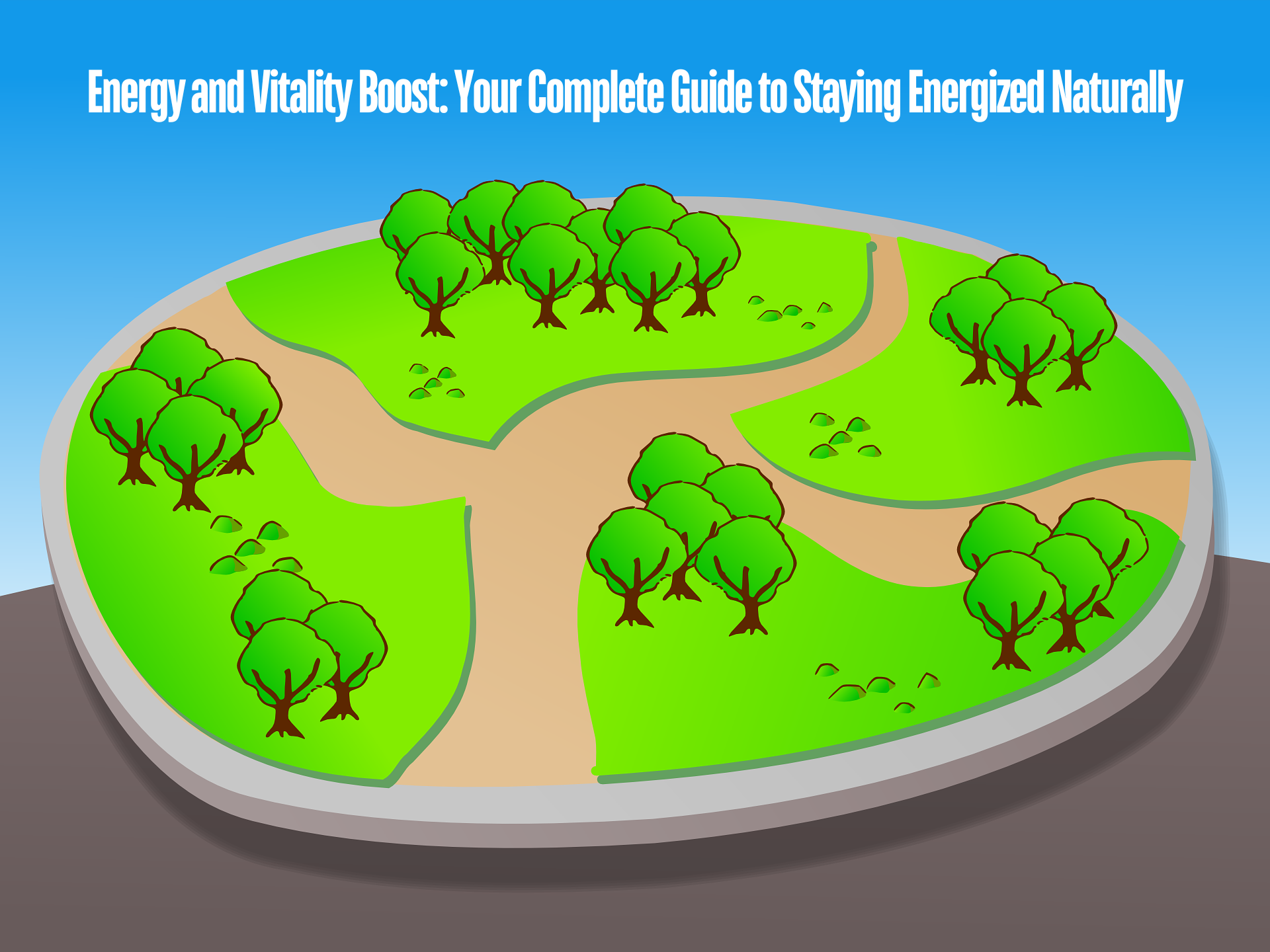In today’s fast-paced world, maintaining energy and vitality is essential for achieving your goals, staying productive, and feeling your best. Many people find themselves struggling with low energy or burnout, and the search for natural solutions to improve vitality has become more important than ever. The good news is that there are proven methods to increase your energy levels naturally, without relying on quick fixes or unhealthy stimulants.
Explore the concept of energy and vitality, look at the underlying causes of fatigue, and provide actionable tips to help you boost your energy levels and sustain them throughout the day. Whether through nutrition, exercise, or mental health practices, you’ll find the tools to unlock a more vibrant, energized version of yourself.
What is Energy and Vitality?
Energy refers to the physical and mental capacity to perform tasks, both big and small. Vitality, on the other hand, is the sense of feeling alive, alert, and full of life. It’s not just about having energy to get through the day but also about feeling well and balanced in every aspect of life.
Why Is Energy and Vitality Important?
Maintaining optimal energy levels is crucial for productivity, mood stability, and overall well-being. When your body and mind are functioning at peak levels, you’re more efficient, more focused, and can handle daily challenges with ease. Conversely, low energy can result in poor performance, irritability, and long-term health issues.
The Science Behind Energy Production in the Body
Understanding how your body produces energy helps you figure out how to maintain it. The body’s primary source of energy is adenosine triphosphate (ATP), which is generated through metabolic processes in your cells.
The Role of ATP in Energy Production
ATP acts like a rechargeable battery that powers everything from muscle contractions to mental concentration. When your body breaks down food into glucose, it converts this fuel into ATP through cellular respiration. An efficient metabolism means more ATP and, subsequently, more energy for your daily activities.
How Metabolism Affects Energy Levels
Metabolism plays a vital role in determining how much energy your body can generate. A slow metabolism can leave you feeling tired and sluggish, while an optimized metabolic rate ensures that your body is effectively turning nutrients into energy.
Common Causes of Low Energy
Many factors can deplete your energy levels, from poor dietary choices to lack of sleep. Identifying the root causes of fatigue is key to developing strategies to increase your vitality.
1. Poor Diet and Nutrient Deficiencies
A diet lacking in essential nutrients like B-vitamins, iron, or magnesium can lead to chronic fatigue. These nutrients play a crucial role in energy production at the cellular level.
2. Lack of Physical Activity
A sedentary lifestyle reduces circulation and weakens your cardiovascular system, leading to diminished stamina and endurance.
3. Stress and Mental Exhaustion
Chronic stress elevates cortisol levels, which can deplete your energy reserves and leave you feeling mentally drained.
4. Sleep Deprivation
Inadequate sleep prevents the body from repairing itself, leading to reduced energy and concentration.
How Nutrition Impacts Energy Levels
The food you eat has a direct impact on how energetic you feel. Choosing the right balance of nutrients can help sustain your energy levels throughout the day.
Key Nutrients for Energy
Several nutrients play a pivotal role in energy production:
- B-Vitamins: Essential for converting food into energy.
- Iron: Helps deliver oxygen to your muscles, which is necessary for sustaining energy.
- Magnesium: Supports muscle function and energy production.
Foods That Naturally Boost Energy
Incorporating certain foods into your diet can significantly improve energy levels.
1. Complex Carbohydrates
Whole grains, oatmeal, and quinoa provide slow-releasing energy that keeps you full and alert for longer periods.
2. Lean Proteins
Chicken, fish, eggs, and plant-based proteins help repair and build muscle, maintaining your body’s stamina.
3. Healthy Fats
Foods like avocados, nuts, and olive oil offer long-lasting energy, thanks to their high content of healthy fats.
Hydration: The Often Overlooked Energy Booster
Dehydration can quickly sap your energy. Make sure to drink plenty of water throughout the day to stay hydrated and keep your energy levels up.
The Power of Exercise in Enhancing Vitality
Exercise isn’t just for physical fitness; it’s one of the most effective ways to boost energy and improve mental clarity.
How Exercise Boosts Energy Levels
Physical activity improves circulation, allowing more oxygen and nutrients to reach your muscles and brain. Regular exercise increases your stamina and enhances your body’s ability to generate ATP.
Best Exercises for Energy and Vitality
1. Aerobic Exercise
Cardiovascular activities like walking, running, or cycling improve your heart and lung health, making everyday activities less exhausting.
2. Strength Training
Building muscle increases your metabolic rate, meaning you burn more calories (and generate more energy) even when at rest.
3. Yoga and Stretching
These activities reduce stress, enhance flexibility, and improve circulation, contributing to better energy levels throughout the day.
The Role of Mental Health in Sustaining Energy
Your mental state is just as important as physical health when it comes to energy. Negative emotions and stress can drain your vitality, while a positive outlook boosts it.
How Stress Affects Energy
When you’re stressed, your body releases cortisol, which can lead to feelings of exhaustion if it’s prolonged. Managing stress is essential for maintaining energy.
Stress-Reduction Techniques
Practices like mindfulness, meditation, and deep breathing exercises can significantly reduce stress, helping to restore balance and improve your overall energy.
The Importance of Quality Sleep
Sleep is where your body restores and recharges itself. Without sufficient rest, even the best diet and exercise routine won’t be enough to keep you feeling energized.
How Sleep Affects Energy Levels
During sleep, your body undergoes repair processes that replenish energy. Poor sleep interrupts this cycle, leaving you feeling tired and sluggish.
Tips for Better Sleep
- Maintain a regular sleep schedule: Go to bed and wake up at the same time every day.
- Create a relaxing bedtime routine: Engage in calming activities like reading or meditating before bed.
- Limit screen time: Avoid using electronic devices at least an hour before bedtime.
Natural Supplements for an Energy and Vitality Boost
Sometimes, diet and exercise aren’t enough, and supplements can provide an extra boost. However, it’s essential to choose natural, safe options.
Common Energy-Boosting Supplements
- B-Complex Vitamins: Supports cellular energy production.
- Magnesium: Helps with muscle function and energy production.
- Adaptogens (Ashwagandha, Rhodiola): Herbs that help the body adapt to stress, reducing fatigue.
How to Use Supplements Safely
Before starting any supplement regimen, consult with a healthcare professional to ensure it’s appropriate for your needs and won’t interfere with any medications.
Creating a Routine for Sustained Energy
A well-planned daily routine can help keep your energy levels high from morning to night.
Morning Routine for Energy
Start your day with a nutrient-dense breakfast, hydration, and light physical activity, such as a short walk or stretching.
Overcoming Midday Energy Slumps
Avoid large, heavy meals at lunch. Opt for a balanced, lighter meal to prevent afternoon drowsiness. You can also take short breaks for movement to recharge your energy.
Evening Routine for Better Sleep
Incorporating relaxation techniques such as journaling or meditation in the evening can help you wind down and ensure a restful night’s sleep.
Conclusion
Boosting energy and vitality naturally requires a holistic approach. By focusing on proper nutrition, regular exercise, mental well-being, and quality sleep, you can maintain sustained energy levels and improve your overall sense of vitality. These habits not only boost your physical energy but also enhance your mental clarity and emotional resilience, helping you feel your best every day.
FAQs
1. What foods should I avoid to maintain energy levels?
Avoid processed foods, sugary snacks, and excessive caffeine, as they lead to energy crashes.
2. How does hydration affect energy levels?
Dehydration reduces blood flow and oxygen to the brain, making you feel tired and sluggish.
3. Are there any side effects to taking energy-boosting supplements?
Some supplements may cause side effects if taken in excess or with certain medications. Always consult a doctor before starting new supplements.
4. How long does it take to see improvements in energy with lifestyle changes?
You can start noticing improvements in energy levels within a few days to weeks, depending on the changes made.
5. Does stress management really affect energy?
Yes, stress management helps reduce cortisol levels, which can prevent energy depletion and improve mental clarity.

